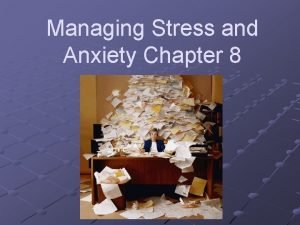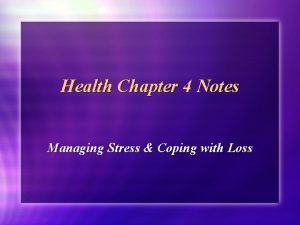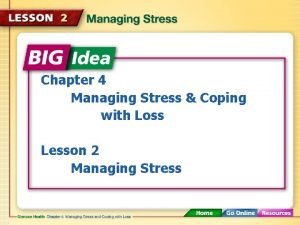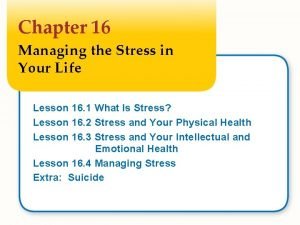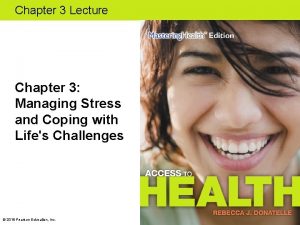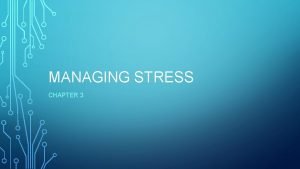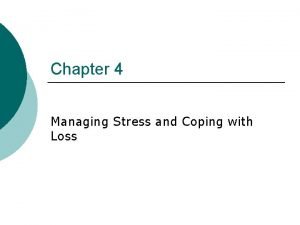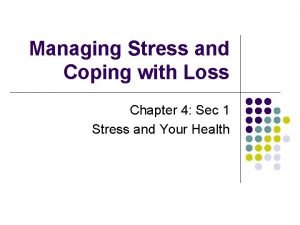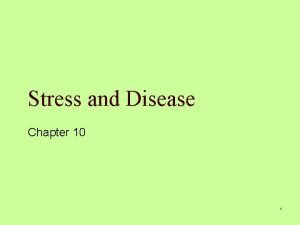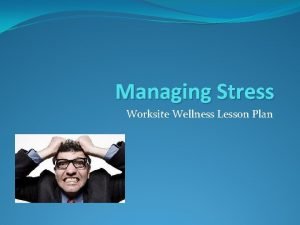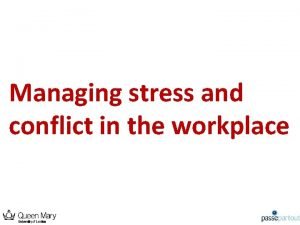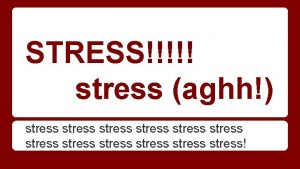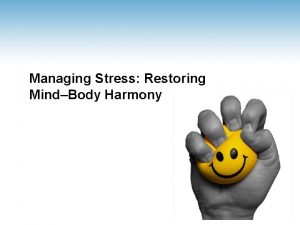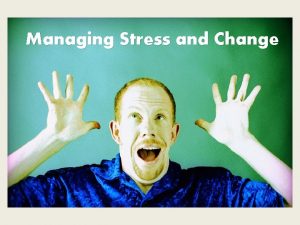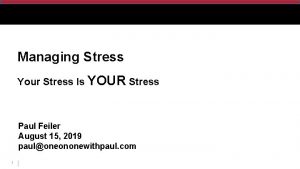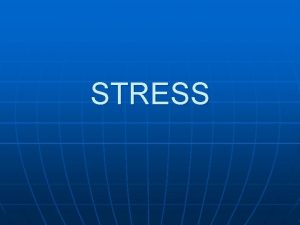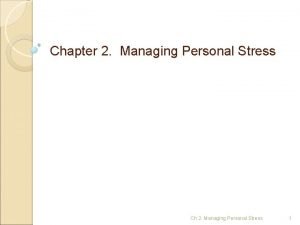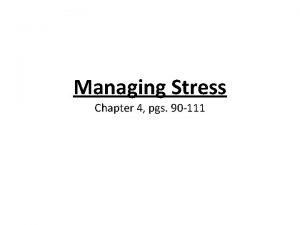MANAGING STRESS Chapter 3 WHAT IS STRESS Stress














- Slides: 14

MANAGING STRESS Chapter 3

WHAT IS STRESS • Stress- response of your body & mind to being challenged. • Two types of Stress • Eustress • Positive Stress • Distress • Negative Stress (An event or situation that causes stress – stressor)

CAUSES OF STRESS • Major Life Changes • Ex. Graduation, divorce, death, serious illness, learning you were adopted • Catastrophes • Events that threaten lives and destroy property • Everyday Problems • Hassel, conflict, pressure to succeed, pressure to be perfect • Environmental Problems • Conditions in your immediate surroundings

ESSENTIAL QUESTIONS • 1. What is Stress • 2. When do people experience stress? • 3. What is meant by the term stressor? • 4. What are the 4 general types of stress?

HOW STRESS AFFECTS YOUR BODY • The body will have 3 stages • Alarm Stage • Body will release adrenaline (cause heart to beat fast, breathing speeds, muscles get tense) • You prepare to “fight or flight” • Resistance Stage • You become tired, irritable, less able to handle anymore added stress • Exhaustion Stage • Your body can no longer keep up • Physical & emotional resources are depleted

RECOGNIZE STRESS • The warning signs to stress includes changes in how your body functions, & changes emotions, thoughts, & behaviors 1. Behavior changes * overeating, trouble sleep, reckless behavior 2. Physical changes * headache, upset stomach, sweating 3. Changes in thinking * Negative, self criticism, critical of others, unable to concentrate 4. Emotional changes * Angry, irritable, nervous, crying

STRESS & ILLNESS • Stress can reduce bodies ability to fight illness & disease • Stomachaches • Asthma • Headaches • Lowered Resistance to Disease • Heart Disease • 44% of African American Women • 48% of African American Men • #1 Killer of African American’s is Heart Attack & Stroke

ESSENTIAL QUESTIONS • 1. What are the 3 stages in the response of stress? • 2. What is the body’s reaction in the fight or flight stage? • 3. Describe 4 ways you can recognize when you are under stress? • 4. What is the relationship between stress and illness?

STRESS & PERSONALITY • Optimism and Pessimism • Tendency to focus on positive in situation • Tendency to focus on the negative in a situation • Aiming for Perfection • Perfectionist- excepts nothing less then excellence • Don’t focus on mistakes • Take pride in all the things you do well • Accept you cannot be perfect

RESILIENCE • Ability to bounce back • The key is having support of family and friends • Know strengths & weakness and have confidence • Make realistic plans • Have good communication and problem solving skills • Recognize and control their own feelings • Recognize that change is normal

COPING WITH STRESS • Take Control of Stress • Time Management • Mental Rehearsal • Reduce Tension • Physical Activity • Relaxation • Biofeedback (monitor body) • Avoid Negative Thinking • Humor

BUILD RESILIENCE SKILLS • Take care of yourself • Build a support system • Take Action • Help Somebody • Confide in yourself • Go Easy on yourself • Put things into perspective • Find Hassle Free Zone • Stick to your routine

REACH OUT FOR SUPPORT • Sharing problems can help you see more clearly • Parent or Adult relative • Teacher or Religious Leader • School Counselor or Nurse • Sibling or Friend

CLASS ACTIVITY • Choose a stressful situation (Major life change, everyday problem, environmental problem, catastrophe) • Choose a positive coping strategy to dealing with your stressor
 Chapter 8 managing stress and anxiety
Chapter 8 managing stress and anxiety Chapter 4 managing stress and coping with loss notes
Chapter 4 managing stress and coping with loss notes Chapter 4 lesson 2 managing stress answer key
Chapter 4 lesson 2 managing stress answer key Chapter 16 managing the stress in your life
Chapter 16 managing the stress in your life Chapter 3 managing stress
Chapter 3 managing stress Chapter 3 managing stress
Chapter 3 managing stress Chapter 4 managing stress and coping with loss lesson 1
Chapter 4 managing stress and coping with loss lesson 1 Managing stress and coping with loss
Managing stress and coping with loss Chapter 10 stress responses and stress management
Chapter 10 stress responses and stress management Managing stress
Managing stress Organization change and stress management
Organization change and stress management Managing stress and conflict in the workplace
Managing stress and conflict in the workplace True stress vs engineering stress
True stress vs engineering stress Normal stress
Normal stress Chapter 1 managing risk when driving
Chapter 1 managing risk when driving
